| 3DogMike |
| (.400 member) |
| 19/05/22 12:58 PM |

|
|
|
Just a couple of teaser pictures for now.
Bore is absolutely pristine excellent.
Have not gotten it to the range yet………
- Mike
100 yard standing with 2 leaves marked 300 yards and 400 yards. 25" barrel and 7lbs 10oz

Cogswell & Harrison .242 Vickers on top and Rigby .275HV on bottom

| Huvius |
| (.416 member) |
| 19/05/22 01:39 PM |

|
|
|
And to think you could have bought a Highland Stalker instead of an old junker like that...
| degoins |
| (.333 member) |
| 19/05/22 09:36 PM |
|
|
"And to think you could have bought a Highland Stalker instead of an old junker like that..."
LOL!!
Lovely rifle!!!
The forearm looks longer than the usual Rigby configuration to me. Maybe special ordered that way?
NitroX
|
| (.700 member) |
| 19/05/22 11:38 PM |

|
|
|
Quote:
And to think you could have bought a Highland Stalker instead of an old junker like that...
We need the price comparisons after that comment?

| Louis |
| (.375 member) |
| 20/05/22 02:23 AM |
|
|
Congratulations on your new acquisition, Mike; a really fine one!
Louis
| 3DogMike |
| (.400 member) |
| 20/05/22 03:50 AM |

|
|
|
Quote:
"And to……..(snip)….
The forearm looks longer than the usual Rigby configuration to me. Maybe special ordered that way?
Good eye! Yes the forearm is about 1” longer than my Cogswell & Harrison .242 and my Mauser Type A 9.3
Steve Bertram, who has seen and handled a lot of British sporting rifles, noticed that forearm right away.
There was no note in the Rigby records as to a special order length, it was sold by Rigby to W. Atkinson & Son a retailer in Lancaster, Lancashire.
Detail pictures and a range report in due course.
- Mike
| 3DogMike |
| (.400 member) |
| 20/05/22 03:59 AM |

|
|
|
Quote:
And to think you could have bought a Highland Stalker instead of an old junker like that...
Right!

- Mike
| degoins |
| (.333 member) |
| 20/05/22 04:49 AM |
|
|
Looking forward to more pictures and the range report. Thanks again sharing.
| 3DogMike |
| (.400 member) |
| 21/05/22 04:06 AM |

|
|
|
Some detail pictures of the Rigby. I'm no professional photographer as you may be able to tell.
All the proof marks are under the wood so no pictures of those right away.
My plan is to get the scope mount screw holes filled and resurrect the engraving on the front ring back to original look as it came out of Rigby in 1936
That hideous rough cast finish Parker Hale after market safety has to go, will replace with traditional Mauser 98 safety, once again to return it to it's 1936 roots.
If there is anything specific you would like to have a picture of just let me know.
- Mike







Mauser number above Rigby serial number

| 3DogMike |
| (.400 member) |
| 21/05/22 06:19 AM |

|
|
|
Original wood numbered to the rifle:

London Proof Marks:

Barrel number?

Mauser production stamps, I don't know enough about these to comment:

| 93x64mm |
| (.416 member) |
| 21/05/22 06:39 AM |
|
|
Lovely find you have there Mike!
Great old cartridge too!
140gn Noslers do well on deer
| prairie_ghost |
| (.300 member) |
| 21/05/22 09:41 AM |
|
|
So is this a military or commercial action. If Military, why would they have used it. And so what if they did, is there any real difference other than cachet afforded the commercial action?
| eagle27 |
| (.400 member) |
| 21/05/22 11:07 AM |
|
|
|
|
Quote:
So is this a military or commercial action. If Military, why would they have used it. And so what if they did, is there any real difference other than cachet afforded the commercial action?
I don't think the Oberndorf Mauser Sporters use the bullet point opening magazine floorplate which was the normal Military opener, the sporters used either the lever under the floorplate or button in the trigger bow? Rigby being the Mauser agent it is surprising they would use a military action unlike Jeffery and others who used them wanting to cut Rigby's prices out of the deal.
| degoins |
| (.333 member) |
| 21/05/22 11:22 PM |
|
|
The Oberndorf sporting actions used a variety of magazine openers. A lot of variance in the sporter configuration even between the various models.
| degoins |
| (.333 member) |
| 21/05/22 11:24 PM |
|
|
Again Mike, thanks for sharing that treasure with us.
| prairie_ghost |
| (.300 member) |
| 22/05/22 12:13 AM |
|
|
Would the timeframe of 1936 have anything to do with the choice of using mil vs commercial action. Throughout the archives stored on the site I do not recall seeing another. Very nice rifle.
| bouldersmith |
| (.375 member) |
| 22/05/22 11:33 PM |
|
|
This rifle was built on a commercial action with a military style floorplate release, it is not a military action or bottom metal. I have seen quite a few pre-war Rigby rifles in this configuration from early 1900's transitional actions to this late 30's gun. While the floorplate release is the same as a military gun, the shape of the trigger bow is more refined with a waist and is nicely domed.
| DORLEAC |
| (.333 member) |
| 23/05/22 04:34 PM |
|
|
|
|
In fact, the .275 Rigby made before the war came out from the Oberndorf factory as barrelled actions fully finished in the white and proofed while Rigby only intervention was limited to stocking, sighting and finishing.
The .275 used intermediate length action and, to date, all the ones I got in hands had this type of floorplate, a magazine found on commercial C-Types as well as quite a few other civilian models.
DORLEAC
www.dorleac-dorleac.com
| 3DogMike |
| (.400 member) |
| 24/05/22 01:36 AM |

|
|
|
Quote:
In fact, the .275 Rigby made before the war came out from the Oberndorf factory as barrelled actions fully finished in the white and proofed while Rigby only intervention was limited to stocking, sighting and finishing.
The .275 used intermediate length action and, to date, all the ones I got in hands had this type of floorplate, a magazine found on commercial C-Types as well as quite a few other civilian models.
DORLEAC
www.dorleac-dorleac.com
Thanks for this input (as well as Steve's (bouldersmith), very informative to hear from fellows that really know the trade.
Interestingly enough I suspect Rigby had (at least in the 1930's) some of the stocking outsourced to "the trade". My Cogswell & Harrison .242 Vickers has almost line for line & inch for inch (mm?) exactly the same stocking, buttplate, and checkering on forend/pistol grip. I would suspect they both had to have come from the same stocker/checkerer?
As well, this Rigby carries no German proof marks whatsoever, only London proof marks.
- Mike
NitroX
|
| (.700 member) |
| 24/05/22 03:02 AM |

|
|
|
Yes excellent input by Joel.
| bwanabobftw |
| (.375 member) |
| 24/05/22 09:49 AM |
|
|
What a wonderful old rifle !!!!!!!!!!Thanks for sharing it with us.
Robert
NitroX
|
| (.700 member) |
| 24/05/22 07:43 PM |

|
|
|
Is a .275HV any different to a 7x57? Or a .275 Rigby? Other than by name?
| DORLEAC |
| (.333 member) |
| 24/05/22 09:19 PM |
|
|
|
|
Quote:
As well, this Rigby carries no German proof marks whatsoever, only London proof marks.
- Mike
Please check if the action is an intermediate one.
Some .275 we reassembled on standard length action with English barrels.
I'm very busy but will try to post good pictures of various N°1HV rifles.
DORLEAC
www.dorleac-dorleac.com
| Marrakai |
| (.416 member) |
| 24/05/22 11:35 PM |

|
|
|
Quote:
Is a .275HV any different to a 7x57? Or a .275 Rigby?
John:
It is the same cartridge but loaded with a 140gr bullet, thus achieving "higher velocity" than the standard 173-grainer.
| 3DogMike |
| (.400 member) |
| 25/05/22 12:18 AM |

|
|
|
Quote:Quote:
Is a .275HV any different to a 7x57? Or a .275 Rigby?
John:
It is the same cartridge but loaded with a 140gr bullet, thus achieving "higher velocity" than the standard 173-grainer.
+1
To add to the discussion; the appellation ".275 Rigby" is a fairly modern adaptation of the cartridge name. Originally was known as the ".275 Bore cartridge ….. for Rigby Magazine Rifle" or "for Mauser-Rigby Rifle"
The "HV" was simply to set the 140 grain bullet at 2800'/sec apart from the "standard" loading 7x57 Mauser (or .275 as known in England and the Colonies).
The only apparent difference in the rifles was how the iron sights were filed in for the specific loadings and then engraved/stamped with the proper cartridge info.
- Mike
ADDED:
Removed the stock & measured the action, it is almost assuredly a "standard length" commercial action.
| kuduae |
| (.400 member) |
| 25/05/22 04:06 AM |
|
|
Quote:
In fact, the .275 Rigby made before the war came out from the Oberndorf factory as barrelled actions fully finished in the white and proofed while Rigby only intervention was limited to stocking, sighting and finishing.www.dorleac-dorleac.com
Joel, not even stocking! Go to page 35 of Jon Speed’s “Archive” book: There you find some 1905 Mauser factory photos of barreled actions in the white as shipped to Rigby’s. They were complete with sight bases and sling eyes. And there is a note too about the Mauser, Oberndorf factory making stocks for Rigby to a pattern supplied by Rigby. Further, Jon once told me he had found “Stocks for Rigby rifles” in a 1920s Oberndorf factory inventory.
| kuduae |
| (.400 member) |
| 25/05/22 04:49 AM |
|
|
To me, this action and barrel lack all the earmarks of a 1930s Mauser, Oberndorf commercial action:
I have yet to see an original 1930s commercial action with a round instead of teardrop bolthandle and a short striker nut, features that appear on late commercial actions from 1940 to 1945 only.
The serial number 1124 does not fit into the Mauser commercial sequence. A 1930s Mauser number would be in the 110000 to 116000 range. Such a Mauser number would be on the underside of the receiver, behind the recoil lug, on all commercial actions sold to other gunmakers. Here the receiver lacks the typical script G or Q worker’s and the ornate "gothic letter" marks usually found on such actions. Instead, there is a plethora of worker’s marks as usually found on receivers made by the government arsenals up to WW1. Then there is a German civilian crown/U view mark under the front end of the receiver ring.
The barrel dimensions in mm are marked on the barrel at right angles. The Mauser factory put this information on lengthwise.
As it is a standard length large ring action, it is a Gewehr 98 action left over from WW1 production, likely barreled in Suhl and bought in by Rigby from a source other than Mauser. The “commercial” appearing triggerguard does not change my opinion as it is just a matter of filing to reshape a rough military undermetal to this form, a common feature of Suhl made Mausers.
| kuduae |
| (.400 member) |
| 25/05/22 06:30 AM |
|
|
Some examples of what the receiver undersides of commercial Mauser, Oberndorf actions sold to other gunmakers look like:
Mauser #17 on an early cock on closing transitional action, rifle by Sauer & Sohn, Suhl. The lowest Mauser number I have seen. #19 is on a Rigby rifle.

#114 Rigby #1059

#199 Rigby #2457

#279 on a Sauer & Sohn rifle

#19759 on a Suhl made rifle retailed by Hermann Franck in Magdeburg

#22064 by W. Foerster, Berlin

#49784 retailed by W. Bening in Wilhelmshafen, but Suhl made also

#74352

| 3DogMike |
| (.400 member) |
| 25/05/22 06:31 AM |

|
|
|
Quote:
To me, this action and barrel lack all the earmarks of a 1930s Mauser, Oberndorf commercial action:
I have yet to see an original 1930s commercial action with a round instead of teardrop bolthandle and a short striker nut, features that appear on late commercial actions from 1940 to 1945 only.
The serial number 1124 does not fit into the Mauser commercial sequence. A 1930s Mauser number would be in the 110000 to 116000 range. Such a Mauser number would be on the underside of the receiver, behind the recoil lug, on all commercial actions sold to other gunmakers. Here the receiver lacks the typical script G or Q worker’s and the ornate K marks usually found on such actions. Instead, there is a plethora of worker’s marks as usually found on receivers made by the government arsenals up to WW1. Then there is a German civilian crown/U view mark under the front end of the receiver ring.
The barrel dimensions in mm are marked on the barrel at right angles. The Mauser factory put this information on lengthwise.
As it is a standard length large ring action, it is a Gewehr 98 action left over from WW1 production, likely barreled in Suhl and bought in by Rigby from a source other than Mauser. The “commercial” appearing triggerguard does not change my opinion as it is just a matter of filing to reshape a rough military undermetal to this form, a common feature of Suhl made Mausers.
kuduae,
This is very interesting and informative, thanks for adding this.
A question then: the left action siderail has no markings at all, but with a thumb cutout. If a Gewehr 98 WW1 production would this mean that the action bypassed the step in fabrication/acceptance where it would have been stamped "Gew 98" or similar? Could this have later been ground/polished off by Rigby or their supplier?
My 1930's made Cogswell and Harrison M98 also has no action markings save the (Vickers?) serial number and London View stamp.
The smaller parts (bolt, bolt shroud, bolt stop, etc are all stamped with the last two digits "23" of the "1123" upper stamp on the receiver ring found above the Rigby serial number "5628".
I believe the mentioned German crown/U view mark under the front of the receiver ring is actually the London crown/V view mark the same as with the London proof marks on the barrel?
All very historically interesting.
- Mike
| kuduae |
| (.400 member) |
| 25/05/22 08:17 AM |
|
|
Mike, a simple question, but complicated to answer! First, nearly all the Mauser, Oberndorf commercial actions have the “thumbhole”, patented by Mauser as a means of gas control if a case ruptured. Only few actions with solid left walls were made on special demand from the mid-1930s on.
Before WW1 the Mauser patents were still valid. DWM, mother company of Mauser, made military rifles for the international trade only and left the civilian market to their subsidiary Mauser. The government arsenals Spandau, Erfurt, Danzig and Amberg, were allowed to make military rifles for the German armies only. Anyone wanting to make a sporting rifle with a M98 Mauser actions had three ways to go: Reputable gunmakers had to buy an a commercial action from the Mauser, Oberndorf factory first. At those times the Mauser factory sold more than 70% of their commercial production as “actions only” or barreled actions to other gunmakers.Or he could buy a complete DWM military rifle from a production overrun through the international arms trade and tear it down for the action. And then there was a grey to black market. “Junk” parts that did not pass the stringent military inspection were scrounged from the factories, both DWM and government arsenals, reworked and completed into usable actions and sold to gunmakers. Many such actions went to England and were used by Rigby’s competitors.
This all changed after 1918. Hundreds of thousands of ex. Gewehr 98s and Karabiner 98s had to be demilitarized. At those innocent times cutting off the foreend and removing the bayonet lug did the job. The actions were scrubbed off the military markings and were used to build sporting rifles. In Suhl there was another source for unmarked actions: From 1915 to mid.1917 the making of Gew 98 rifles was decentralized to meet the war demand. All the Suhl and Zella-Mehlis guntrade made parts to be assembled and marked to complete rifles by Sauer&Sohn, Simson abd C.G.Haenel. But none of the Suhl factories were equipped to machine receivers or some other complicated part. So the Suhl guntrade was supplied with machined receivers by the state arsenals and less likely capable companies like Siemens&Halske and H.Pieper in occupied Liege. As the demand of the shrinking German armies was met in mid 1917, Gew 98 making was stopped quite suddenly. So tons of unfinished and unmarked parts were left over. These served the Suhl guntrade through all the interwar years. Suhl dealers exported such new actions made from these stocks too. So there are two possibilities for your unmarked actions: They may be scrubbed ex-military or they may be completed and assembled post-WW1 from left over and new made parts.
Axel
| kuduae |
| (.400 member) |
| 25/05/22 08:57 AM |
|
|
Quote:
I believe the mentioned German crown/U view mark under the front of the receiver ring is actually the London crown/V view mark the same as with the London proof marks on the barrel?
Ooops!, I was looking at the wrong photo only. It is the London view mark indeed.
But to the barrel: Would a 1930s British barrelmaker have marked his barrel with metric numbers for bore diameter, groove diameter and twist length?
| 3DogMike |
| (.400 member) |
| 25/05/22 12:45 PM |

|
|
|
Quote:
…..(snip)... But to the barrel: Would a 1930s British barrelmaker have marked his barrel with metric numbers for bore diameter, groove diameter and twist length?
kuduae,
I'm confused, & admit that I'm no whiz on German proof marks.
Could you enlighten me as to where you get German stamped metric bore, groove, and twist from (I presume) the stamped numbers 67288 on the barrel?
Typical 7mm metric BORE proof was ~6.98mm (.275"), and usual 7x57 twist in metric would be 220mm?
The stamped 7m/m 2.24" on the barrel (7m/m cartridge 2.24" case length) is certainly the British 1925 Rules of Proof required proof mark for a 7x57 chambering and stamped right along with the other London View and Definitive proof marks.
Please clear this up to educate me so as to clear my confusion on this point.
- Mike
| kuduae |
| (.400 member) |
| 25/05/22 06:12 PM |
|
|
My mistake! In your "barrel number?" photo I could read "illegible - 7.2 / illegible" only instead of 67288. I assumed the numbers to be the bore dimension markings as applied by German barrelmakers. So this number has another meaning.
| 3DogMike |
| (.400 member) |
| 25/05/22 11:06 PM |

|
|
|
Quote:
My mistake! In your "barrel number?" photo I could read "illegible - 7.2 / illegible" only instead of 67288. I assumed the numbers to be the bore dimension markings as applied by German barrelmakers. So this number has another meaning.
My very marginal photography skills did not help

- Mike
| DORLEAC |
| (.333 member) |
| 25/05/22 11:16 PM |
|
|
|
|
Just for info, three N°1 Rigby .275 rifles we have sold.
All made on original Mauser intermediate action in the late 1920.
Regards to all.
DORLEAC
www.dorleac-dorleac.com
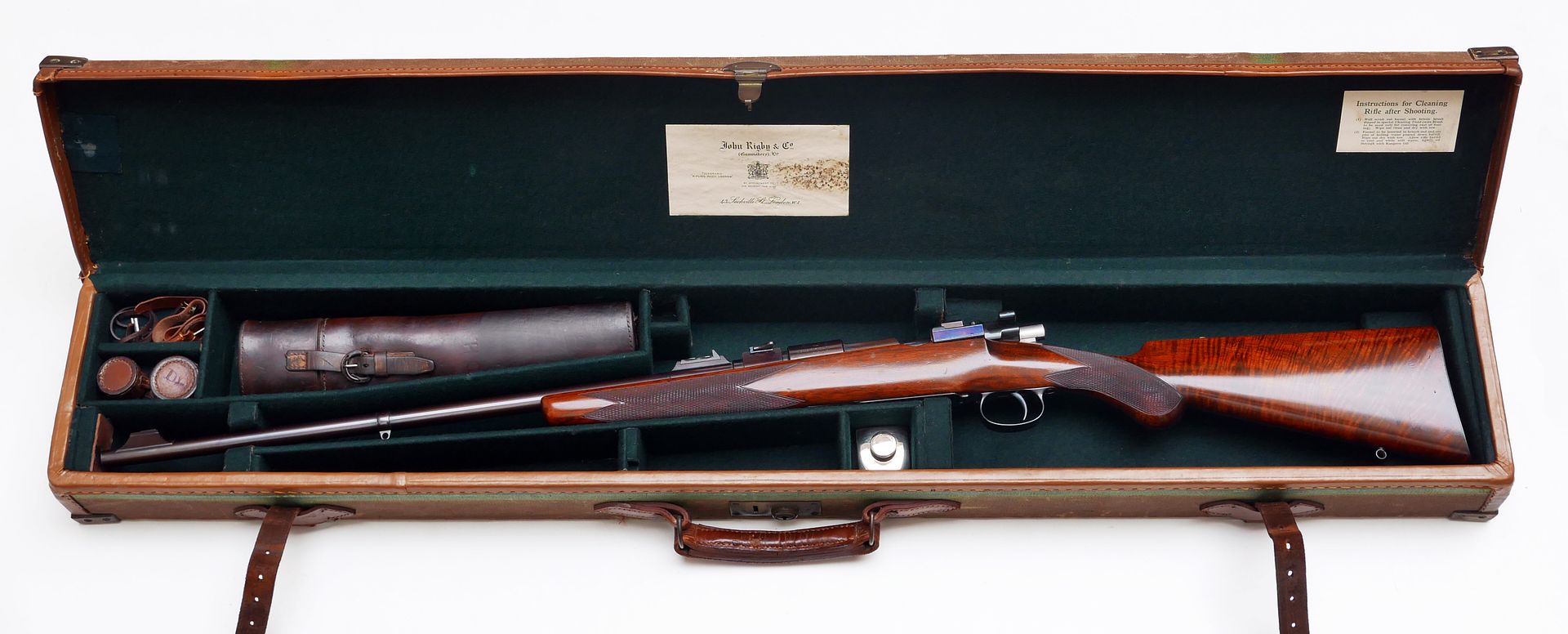
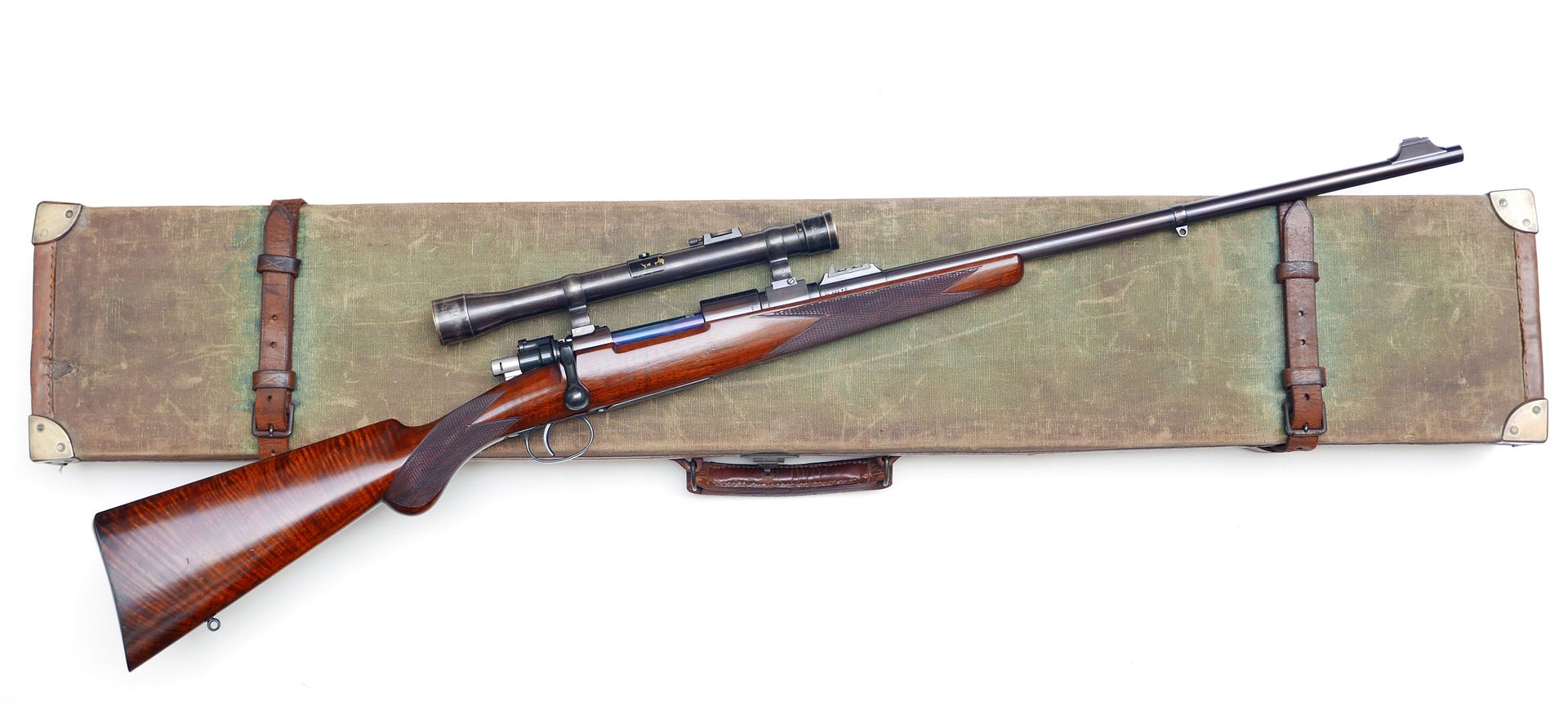
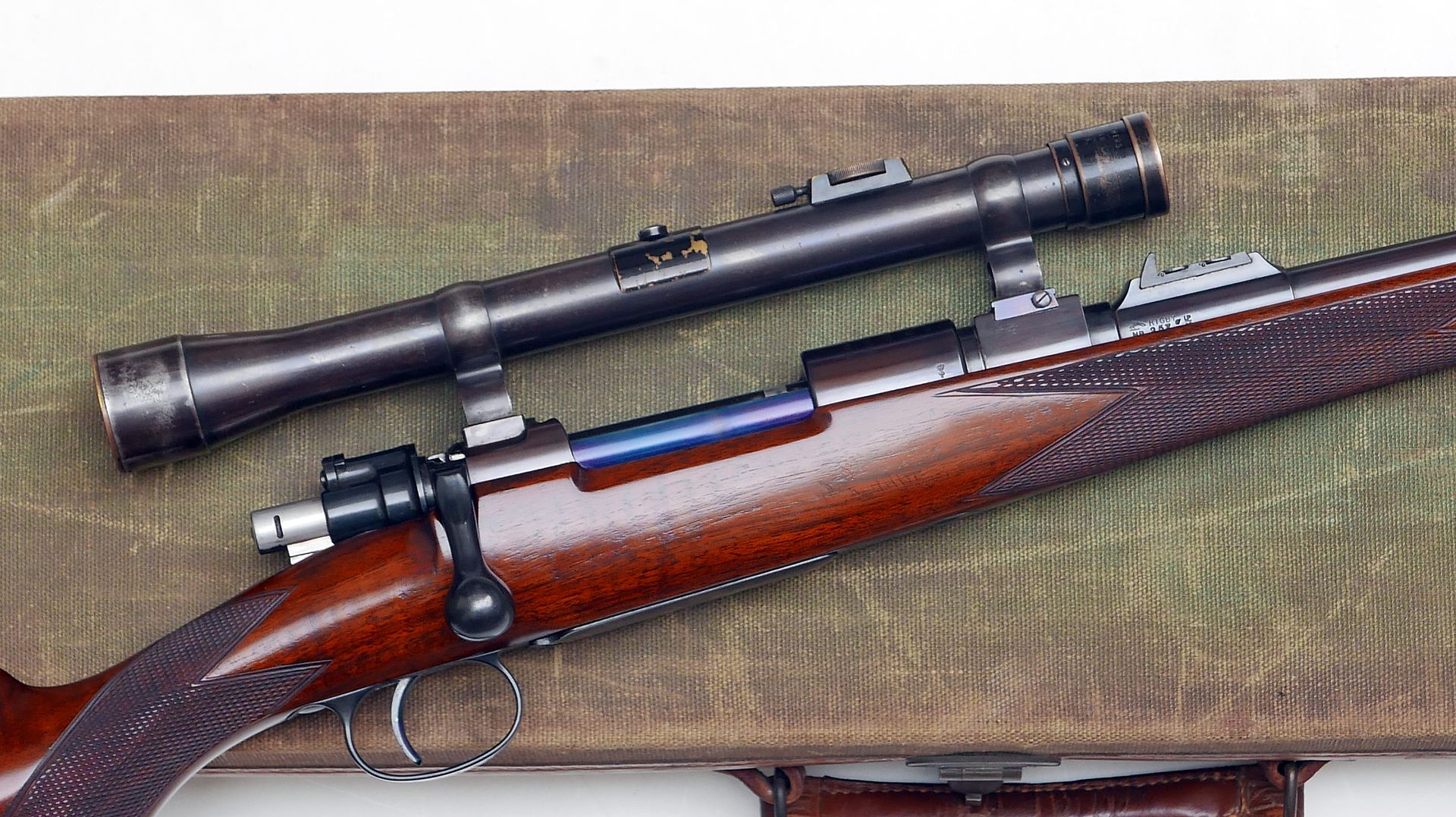
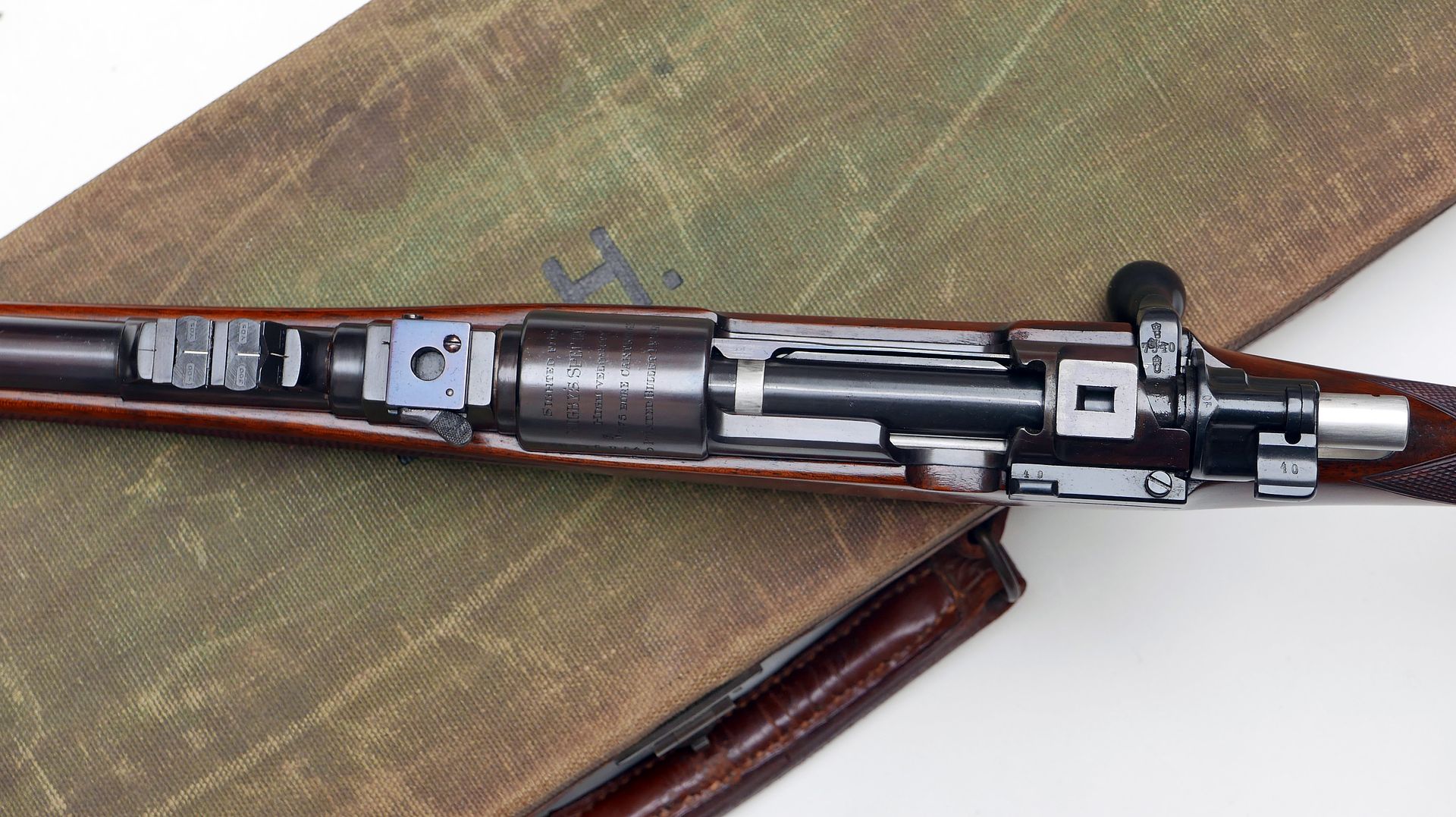
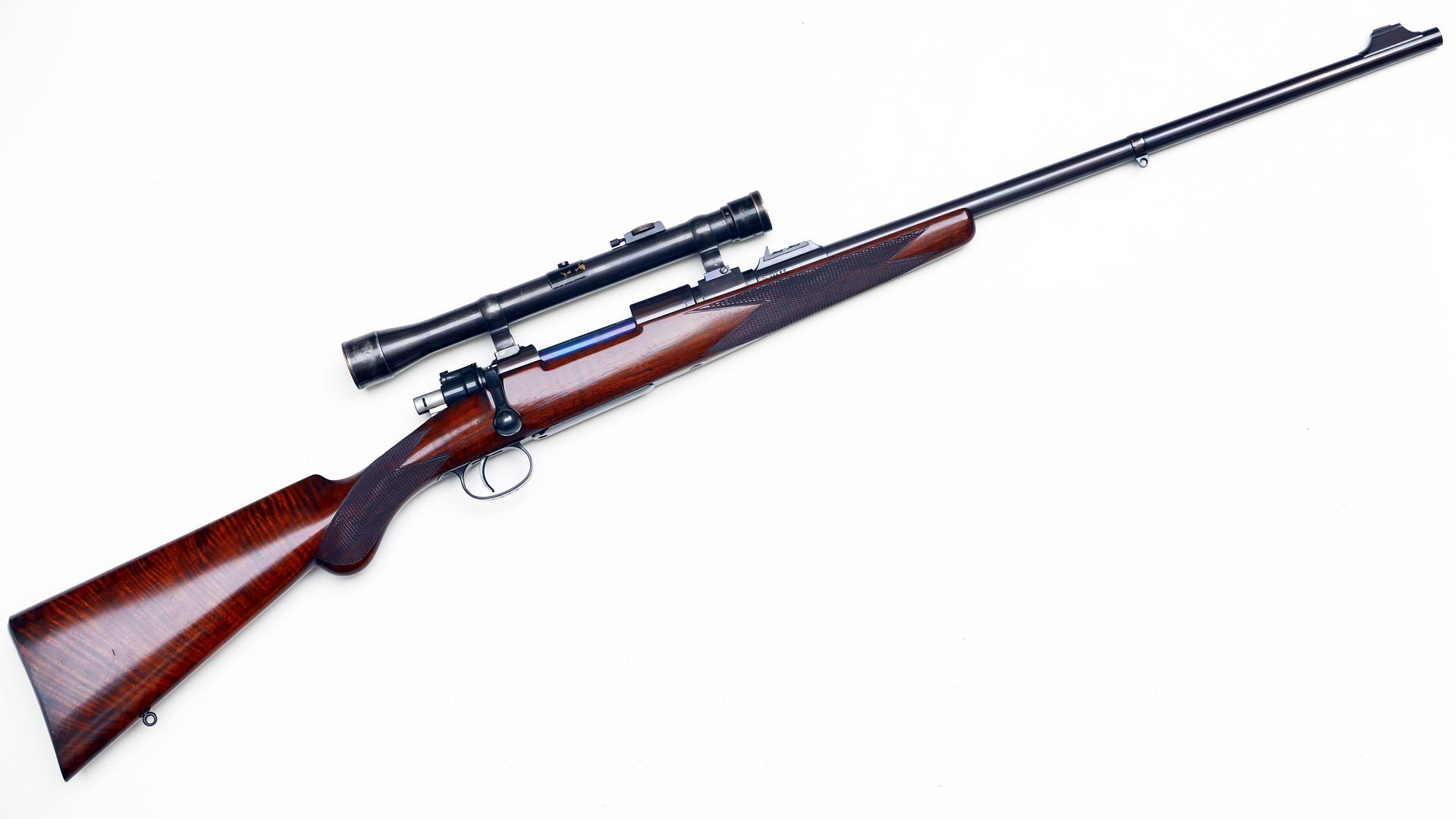


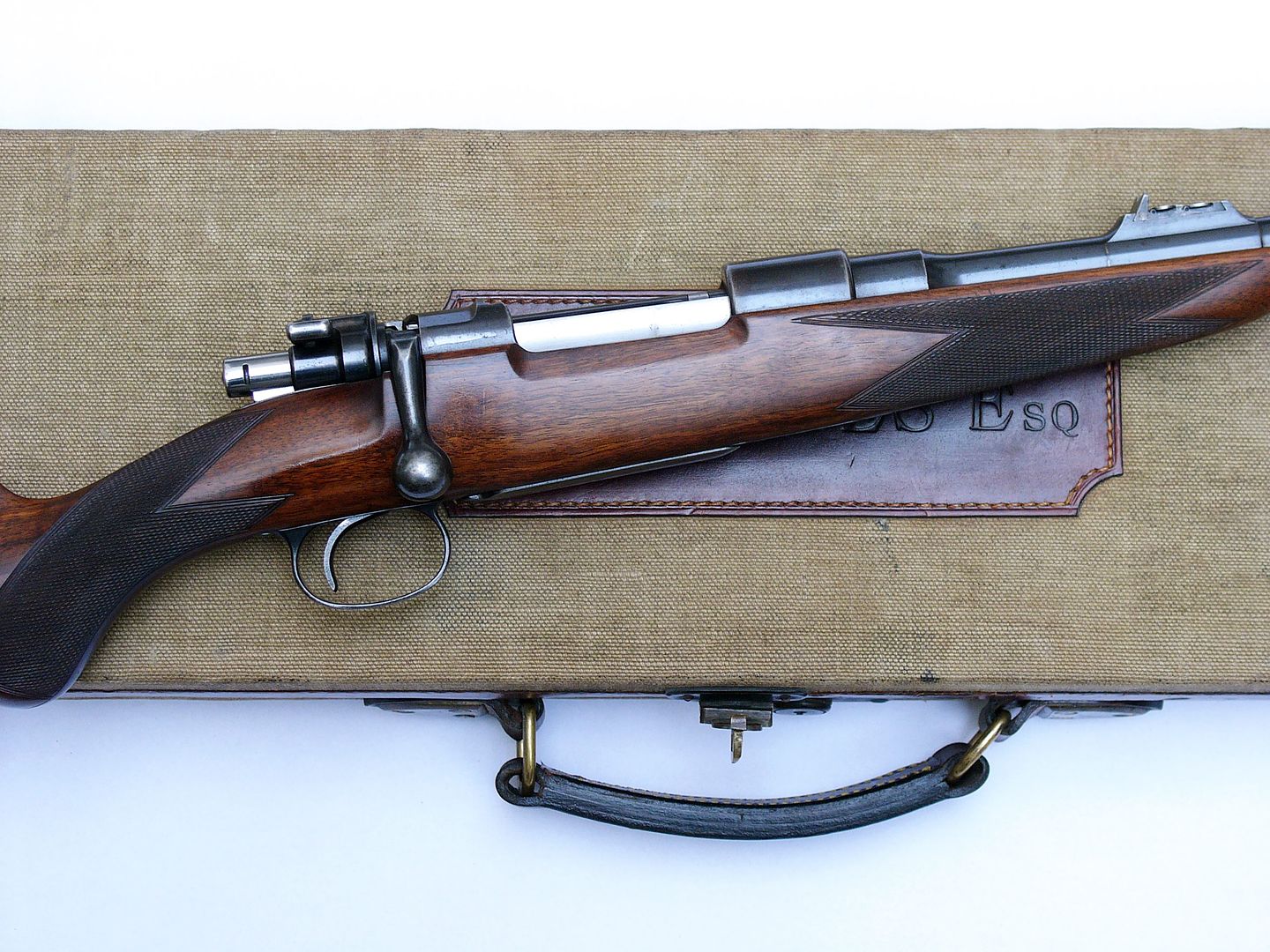
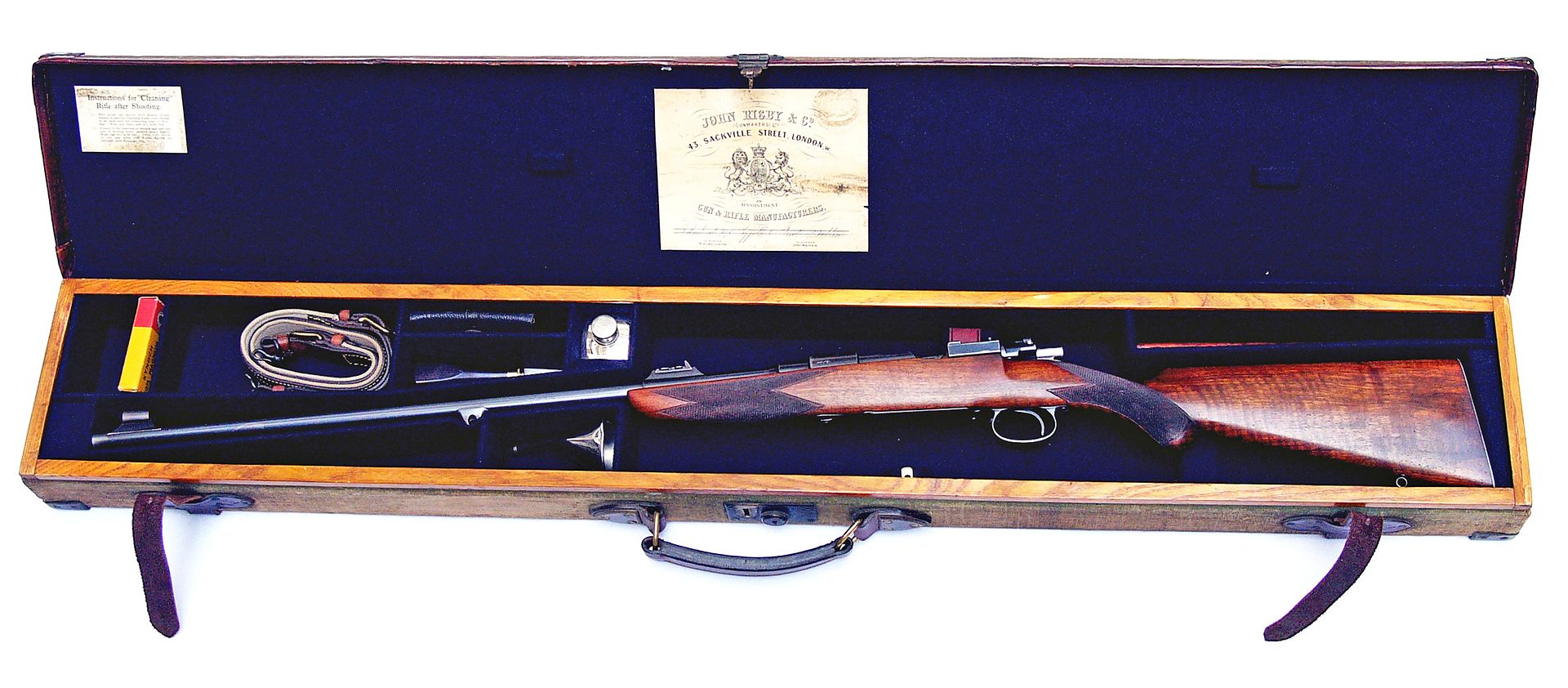
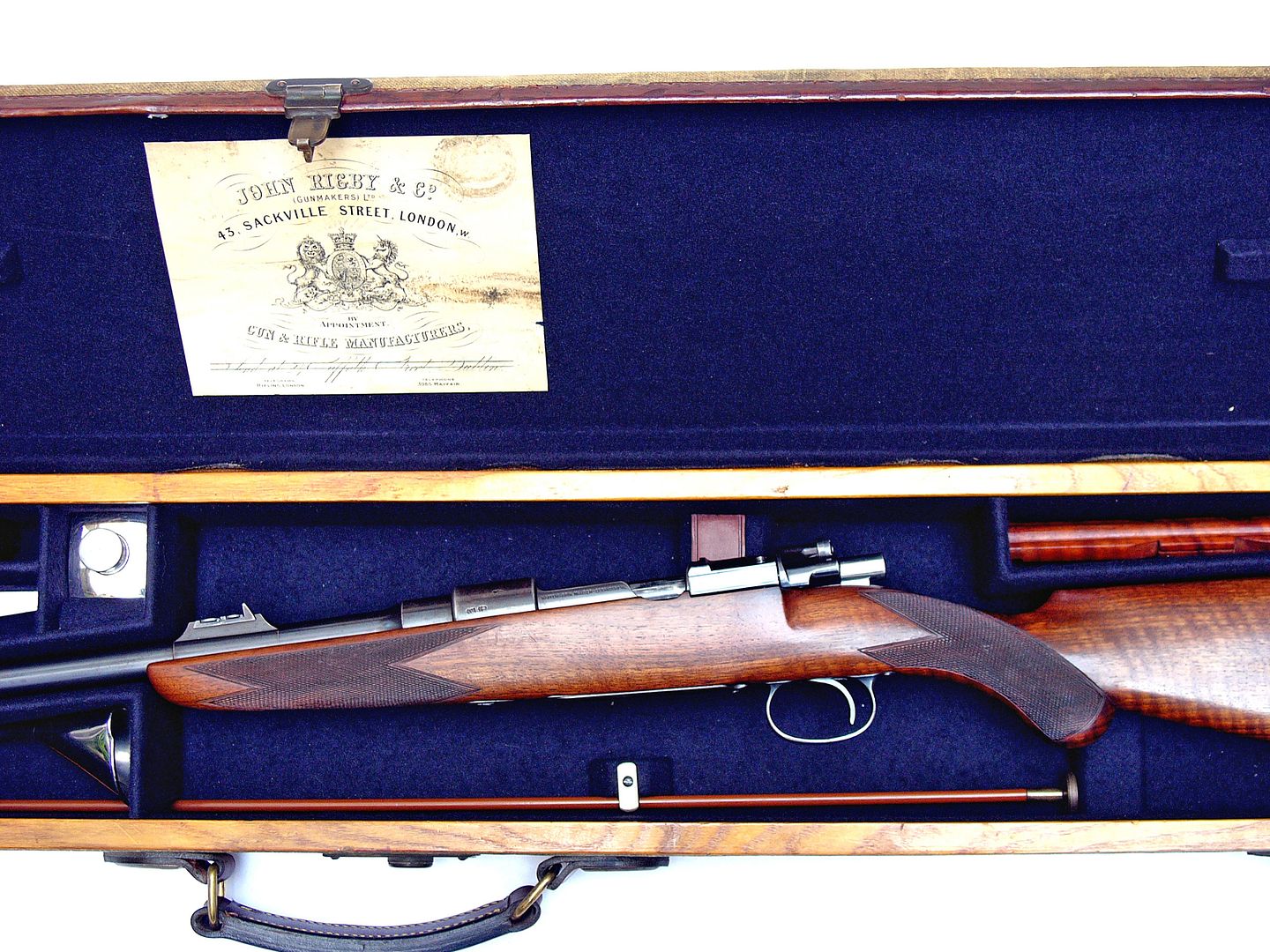
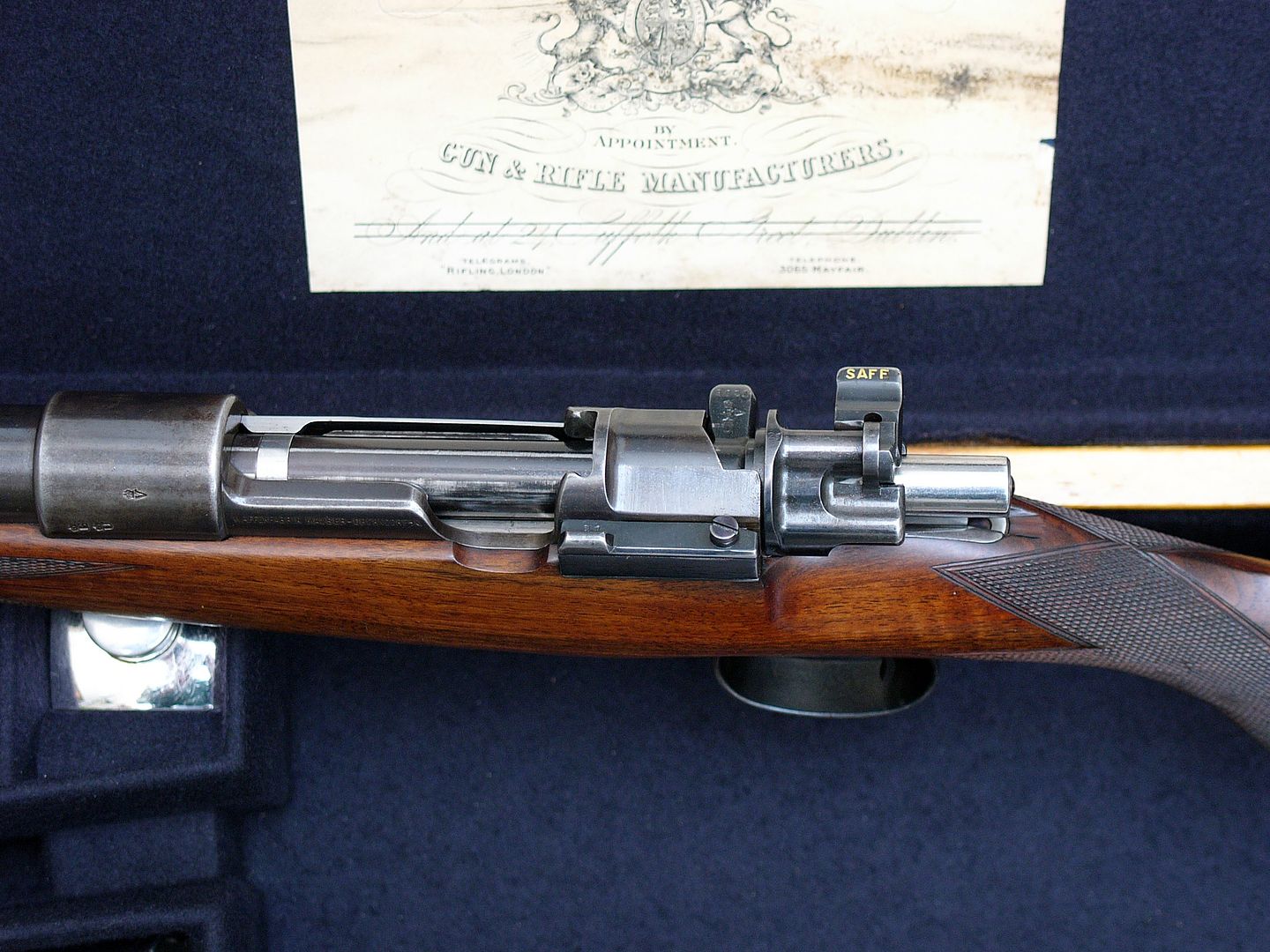
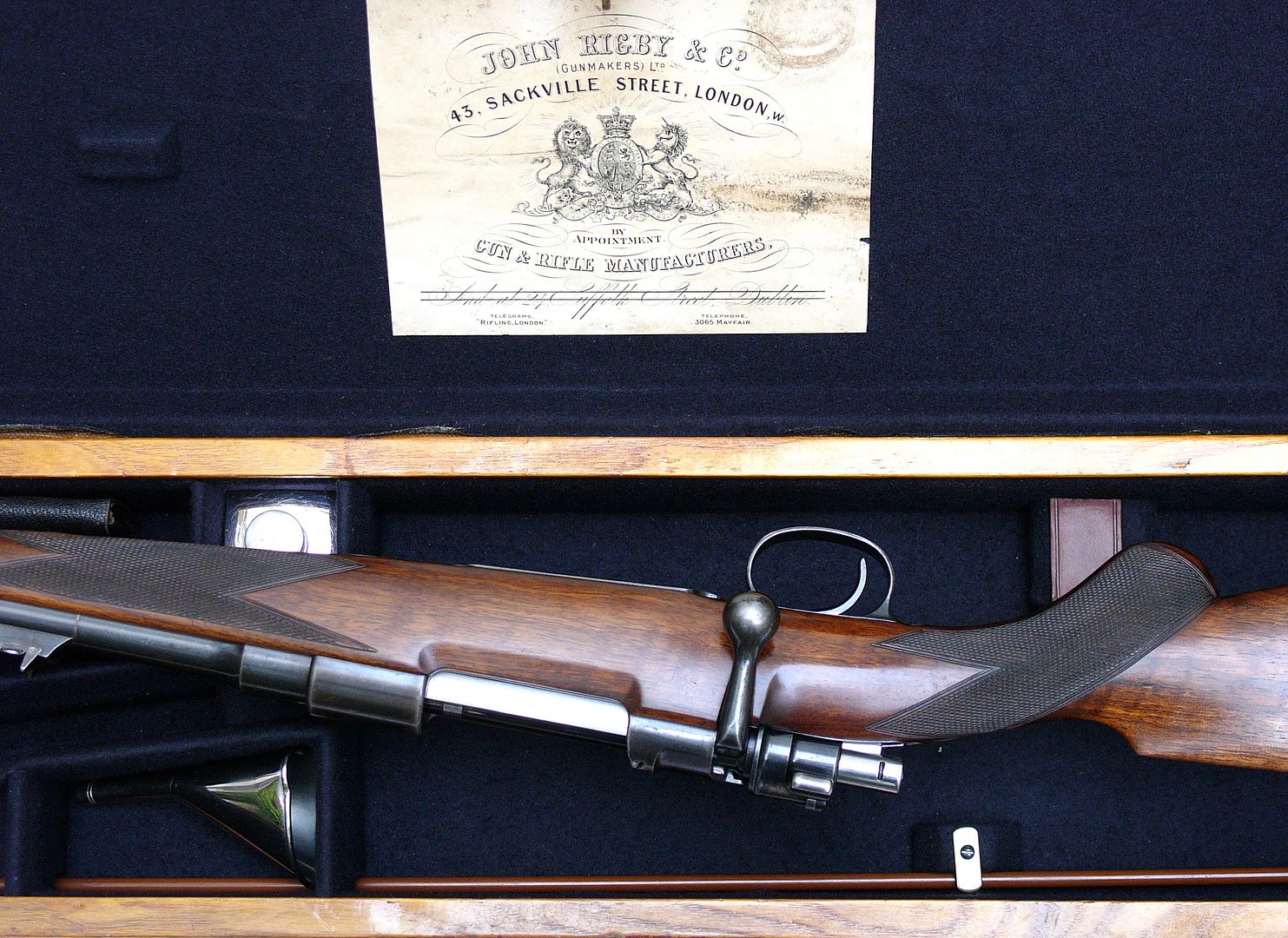

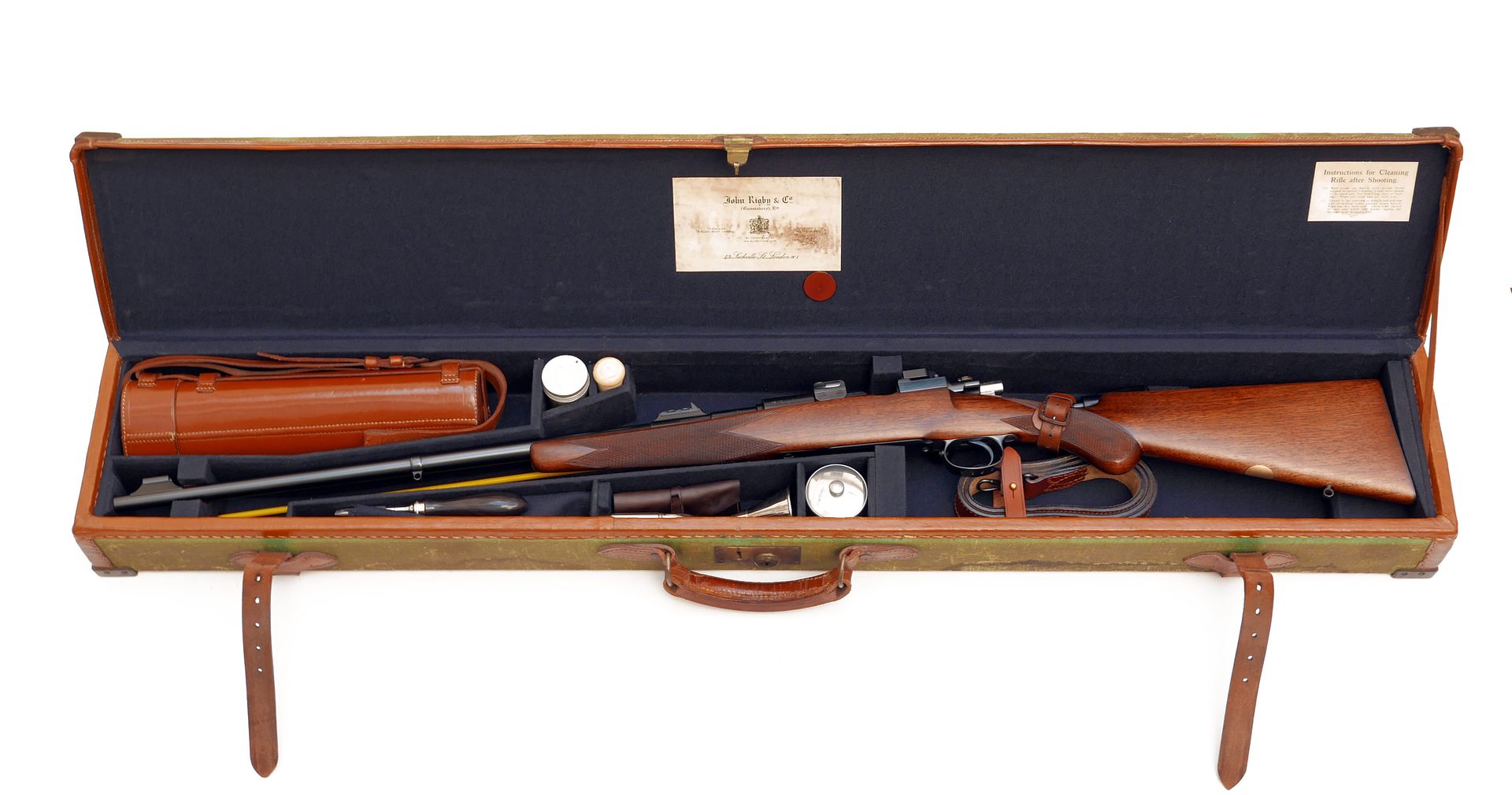
| bouldersmith |
| (.375 member) |
| 25/05/22 11:16 PM |
|
|
As to the shape of the bolt handle, many commercial Mausers from the 1930's had round knobs such as the Standard Modell, Type C rifles and Riechspost rifles. All three resemble military guns more that sporting rifles but were retailed as commercial sporters and German commercial proof marks.
| DORLEAC |
| (.333 member) |
| 25/05/22 11:25 PM |
|
|
|
|
Quote:
As to the shape of the bolt handle, many commercial Mausers from the 1930's had round knobs such as the Standard Modell, Type C rifles and Riechspost rifles. All three resemble military guns more that sporting rifles but were retailed as commercial sporters and German commercial proof marks.
Sorry, but I'm not sure about that at all.
In fact, the round knob appears very late during the period of the Second World War, circa 1943.
On the other hand you can meet this type of round knobs on the very first productions.
Reference should be made to the work of Jon Speed and to his two major books: "Original Oberndorf Sporting Rifles" and "The Mauser Archive".
DORLEAC
www.dorleac-dorleac.com
| Ripp |
| (.577 member) |
| 25/05/22 11:59 PM |
|
|
Quote:
And to think you could have bought a Highland Stalker instead of an old junker like that...



| 3DogMike |
| (.400 member) |
| 26/05/22 01:17 AM |

|
|
|
Quote:Quote:
And to think you could have bought a Highland Stalker instead of an old junker like that...



Ripp, you and Ben (huvius) have shown me the error of my ways. I will go directly to our local gun & pawn to trade it in for a nice new Tikka or Savage in (of course) 6.5 Creedmoore

- Mike
| Ripp |
| (.577 member) |
| 26/05/22 01:25 AM |
|
|
Quote:Quote:Quote:
And to think you could have bought a Highland Stalker instead of an old junker like that...



Ripp, you and Ben (huvius) have shown me the error of my ways. I will go directly to our local gun & pawn to trade it in for a nice new Tikka or Savage in (of course) 6.5 Creedmoore
- Mike
Perfect.. EVERYONE in the know realizes the 6.5CM is the greatest cartridge ever invented..

On a more serious note, YOU made a great purchase and find with this one.. Great job..
| bouldersmith |
| (.375 member) |
| 26/05/22 01:55 AM |
|
|
RE: speed reference pg. 111 at the very bottom "Most Mauser-made sporters had pear shaped bolt handles, but military -type bolt handles were also used."
This is in the section about the Army Hunting rifle Model C.
| kuduae |
| (.400 member) |
| 26/05/22 03:10 AM |
|
|
Quote:
RE: speed reference pg. 111 at the very bottom "Most Mauser-made sporters had pear shaped bolt handles, but military -type bolt handles were also used."
This is in the section about the Army Hunting rifle Model C.
The model C Army type hunting rifles were made using rejected or leftover parts of the military production. They were not offered any more after WW1.
The Standard model and the Modell fuer die Reichspost were military rifles. Not made for the regular Reichswehr, they were sold to paramilitary police and party organisations, bypassing the rules of the Versailles Treaty. As they were not official military rifles they had to undergo civilian proof. They were never sold piecemeal to the public or retailed to individuals. So they cannot be rated as "commercial Mausers".
| Waidmannsheil |
| (.400 member) |
| 31/05/22 07:45 PM |
|
|
Definitely the case. There are several members of the BGRC who have pre-war Rigby's and at least two of them were completely made in Germany including the stocks which have both Mauser numbers inside as well as Rigby. The only thing Rigby did was to specify the details of the rifle such as stock design and types of sights etc.
Matt.
| 3DogMike |
| (.400 member) |
| 01/06/22 09:37 AM |

|
|
|
Shame that Rigby records do not specify any odd details like the stocker, barrel maker, source for action/barreled action. Certainly could have been supplied as action, barreled action, or complete rifle to specification by the trade in England or from Mauser.
Would make for interesting discussion.
As I may have mentioned previously my Cogswell & Harrison M98 in .242 Vickers has a stock (with the exception of the unusual ~1" longer forend on the Rigby) that is line for line, checkering, and steel buttplate a nearly exact clone of the Rigby stock. Both from the mid 1930's.
- Mike